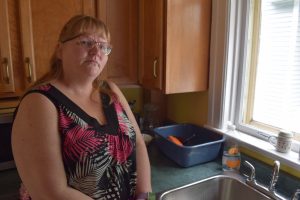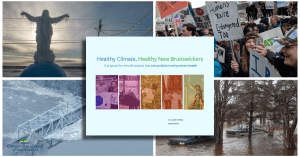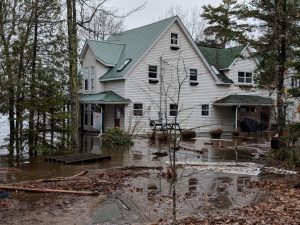Waves violently shook Dawn Burke’s Grand Lake home in 2018. Now she fears for others.

During the peak of the 2018 floods, Dawn Burke re-entered her Grand Lake home after evacuating to find waves crashing through her front sunroom.
This past year, after selling her house to the government, she watched from a safe distance as floods again ravaged the province.
“I was surprised with the anxiety I felt,” she said. “That’s where I see the impact of it. We and our children had anxiety. Our youngest son is 13 and he was concerned. ‘What if it floods again? What’s happening?’”
Burke and her son are not alone.
According to a new report released June 25 by the Conservation Council, climate change and the extreme weather events it is intensifying are having a real impact on New Brunswickers’ physical and mental health.
As the report’s analysis shows, the public health threats of climate change will get worse over the next 30 years without serious action from government, businesses and industries to reduce the carbon pollution fueling these changes.

Burke thought the 6,000-square-foot, three-story property would be her forever home. She lived there for nine years without incident.
But in place of forever, she found heartbreak.
As she recorded waves crashing through her house in what became a viral video, she learned how much damage the lake she loved could do.
“Every wave that hit, shook the house,” she said.
Despite retreating to dry ground, she empathises with what others are still going through.
A sense of loss permeates her life more than a year after being forced out. Visiting the place where she once lived is difficult.
“Mostly, I feel sadness,” she said.
Only rubble greets Burke when she pulls into the driveway. The provincial government tore the house down.
It paid Burke its maximum payout, $160,000, but she said that didn’t scratch the surface of the home’s original value. Still, it would have cost more to repair, raise and move it back.
And even if she and her husband did the necessary work, who would buy their property if they decided to sell?
“No one’s going to buy a house on Grand Lake for a good many years,” she said.
She wishes the provincial government would pay people what their houses were worth before the floods to encourage them to leave the floodplain, but acknowledges the economic reality.
“We’re nearly broke as a province. How does that happen?” she said. “I think that’s where the federal government has to come in and help.
“I don’t see this as something going away. This is only going to get worse.”

Now Burke lives in Minto, 40 minutes away. She’s still fighting with her insurance company over what she believes should have been covered.
Having to come up with a down payment at age 52 is a stress she didn’t expect. Her husband is 64.
“We are truly starting over again.”
But Burke’s family is one of faith, she said, which helps with losing the home where she raised six children. Although her home was beyond repair, she was never without shelter, which she’s grateful for.
“To me, faith is a belief that even though you can’t see what the future holds, you have faith that you’re going to be OK.”
A sense of normalcy is also returning to her life. She chalks it up to moving into her new house.
She hopes others find the same peace.
“I know this is going to be a long haul for families to get back to normal. And what is normal? What happens the next year when the flood comes?”
Part One of our new series, After the flood: how climate change and the extreme weather it’s fueling affect New Brunswickers’ physical and mental health
Recommended links:
- New Conservation Council report: climate change, floods, ice storms affect our health
- Read our new report, Healthy Climate, Healthy New Brunswickers: A proposal for New Brunswick that cuts pollution and protects health.

